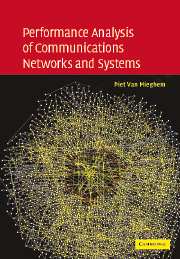Book contents
- Frontmatter
- Contents
- Preface
- 1 Introduction
- Part I Probability theory
- Part II Stochastic processes
- 7 The Poisson process
- 8 Renewal theory
- 9 Discrete-time Markov chains
- 10 Continuous-time Markov chains
- 11 Applications of Markov chains
- 12 Branching processes
- 13 General queueing theory
- 14 Queueing models
- Part III Physics of networks
- Appendix A Stochastic matrices
- Appendix B Algebraic graph theory
- Appendix C Solutions of problems
- Bibliography
- Index
7 - The Poisson process
from Part II - Stochastic processes
Published online by Cambridge University Press: 22 February 2010
- Frontmatter
- Contents
- Preface
- 1 Introduction
- Part I Probability theory
- Part II Stochastic processes
- 7 The Poisson process
- 8 Renewal theory
- 9 Discrete-time Markov chains
- 10 Continuous-time Markov chains
- 11 Applications of Markov chains
- 12 Branching processes
- 13 General queueing theory
- 14 Queueing models
- Part III Physics of networks
- Appendix A Stochastic matrices
- Appendix B Algebraic graph theory
- Appendix C Solutions of problems
- Bibliography
- Index
Summary
The Poisson process is a prominent stochastic process, mainly because it frequently appears in a wealth of physical phenomena and because it is relatively simple to analyze. Therefore, we will first treat the Poisson process before considering the more general Markov processes.
A stochastic process
Introduction and definitions
A stochastic process, formally denoted as {X(t)t є T}, is a sequence of random variables X(t), where the parameter t – most often the time – runs over an index set T. The state space of the stochastic process is the set of all possible values for the random variables X(t) and each of these possible values is called the state of the process. If the index set T is a countable set, X[k] is a discrete stochastic process. Often k is the discrete time or a time slot in computer systems. If T is a continuum, X(t) is a continuous stochastic process. For example, the outcome of n tosses of a coin is a discrete stochastic process with state space {heads, tails} and the index set T = {0, 1, 2, …, n}. The number of arrivals of packets in a router during a certain time interval [a, b] is a continuous stochastic process because t ξ [a, b]. Any realization of a stochastic process is called a sample path.
Information
- Type
- Chapter
- Information
- Performance Analysis of Communications Networks and Systems , pp. 115 - 136Publisher: Cambridge University PressPrint publication year: 2006
Accessibility standard: Unknown
Why this information is here
This section outlines the accessibility features of this content - including support for screen readers, full keyboard navigation and high-contrast display options. This may not be relevant for you.Accessibility Information
- 12
- Cited by
